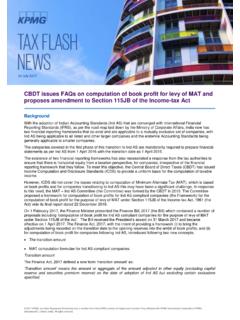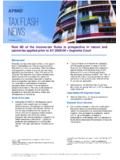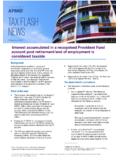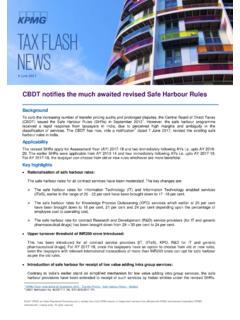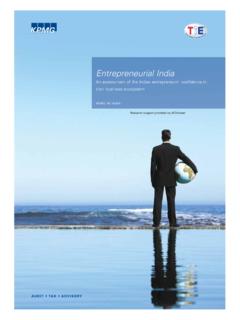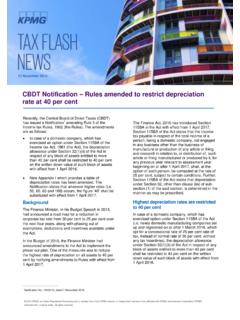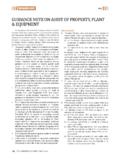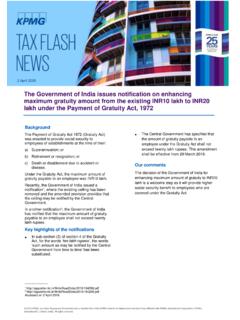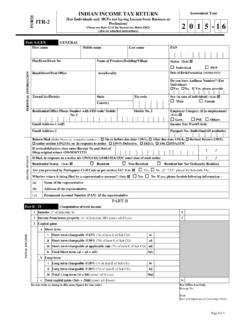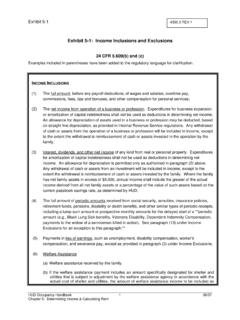Transcription of Services provided by the seconded employees of a …
1 2018 KPMG, an Indian Registered Partnership and a member firm of the KPMG network of independent member firms affiliated with KPMG International Cooperative ( KPMG International ), a Swiss entity. All rights reserved. Services provided by the seconded employees of a foreign company to its subsidiary in India do not result in permanent establishment 3 April 2018 Background Recently, the Delhi Bench of the Income-tax Appellate Tribunal (the Tribunal) in the case of Samsung Electronics Company (the taxpayer) held that the Services provided by the seconded employees of a foreign company to its subsidiary in India do not result in Permanent Establishment (PE) in India.
2 The Tribunal held that the expatriate employees are only discharging functions of subsidiary towards the holding company for the benefit of the business of the subsidiary. It is to make the Global Business Management (GBM) understand the priorities and preferences of the Indian customers by providing India specific information to GBM which in turn then carry out research and development to develop India-specific products. Facts of the case The taxpayer is a tax resident of South Korea engaged in the business of manufacturing and sales of various categories of television, home appliances, telecommunication terminals, semi-conductors as well as other state of the art IT products for global markets.
3 The taxpayer has two wholly owned subsidiaries in India Samsung India Electronics Private Limited (SIEL) and Samsung India Software Operations Private Limited (now known as Samsung R&D Institute India Bangalore Private Limited) (Samsung R&D). _____ 1 Samsung Electronics Company Ltd v. DCIT [2018-TII-91-ITAT-DEL-INTL] During the relevant year, a survey was conducted, wherein it was found that SIEL was manufacturing the items under the technical assistance of the taxpayer for which the taxpayer used to receive Fees for Technical Services (FTS). The Assessing Officer (AO) observed that the parent company had not paid any royalty for the use of its brand name SAMSUNG by the Indian subsidiary company.
4 Thus, the income of Korean company in the form of royalty had escaped assessment. Pursuant to the said survey, the AO issued a reassessment notice to the taxpayer under Section 148 of the Income-tax Act, 1961 (the Act) for initiating reassessment proceedings under Section 147 of the Act for six Assessment Years (AYs) from AY 2004-05 to 2009-10. In response to the above notice, the taxpayer filed its tax returns for all these years declaring income from branch activities for AY s 2004-08 to 2008-09 which was declared in the original return as well and also royalty/FTS which was not declared in the original return for any year. The AO observed that the Indian company's office was being used as place of management for South Asia operations by the parent company and therefore, the Indian company would constitute PE of the foreign parent company under Article 5(2)(a) of the India-Korea tax treaty (tax treaty) and a part of income from sales in South Asian countries such as Bangladesh, Nepal, Bhutan, and Maldives should be attributed to Samsung Electronics, Korea.
5 2018 KPMG, an Indian Registered Partnership and a member firm of the KPMG network of independent member firms affiliated with KPMG International Cooperative ( KPMG International ), a Swiss entity. All rights reserved. The AO held that the Indian company was acting as a dependent agent of the foreign company in terms of Article 5(5) of the tax treaty, and the transactions between the two were not at arm's length. The AO held that expatriates employees create a PE of the taxpayer in India by rendering Services to SIEL through its employees basis, and added an estimated income of 10 per cent on the remuneration paid to such expatriate employees during the years under consideration to determine the profits attributable to tax in India by applying Clause (iii) of Rule 10 of the Income-tax Rules, 1962 (the Rules).
6 The Dispute Resolution Panel (DRP) upheld the order of the AO. Tribunal s decision Reassessment proceedings under Section 147/148 of the Act A perusal of the figures in the statement furnished in respect of the income as reported in the original return of income and the return furnished under Section 148 of the Act leaves no doubt that there is huge difference, and it cannot be said that the notice under Section 148 of the Act is not supported by any valid reason or reasons proposing to re-open the assessment for the AYs between 2004-05 and 2009. It has been held that non-reporting of the receipt of income on account of royalty is a valid ground for the AO to propose the reopening of the assessment, and it cannot be said that there was no escapement of income merely because the tax was deducted at source on such income.
7 When it is open under Explanation 3 to Section 147 of the Act for the AO to reassess the income on any issue which newly comes to his/her notice subsequent to the issuance of notice under Section 148 of the Act, it cannot be said that mere wrong mentioning of the provision of law relating to the other issues in the reasons recorded would vitiate the proceedings. Accordingly, the Tribunal rejected the contention of the taxpayer that the reopening proceedings are bad under the law. Fixed place PE The entire dispute on this issue revolves around the status of the expatriate employees working with the SIEL and the nature of functions they are performing. Whether they are actually the employees of the taxpayer and placed with the subsidiary to run the business of the taxpayer, or they are taxpayer's employees who are seconded to SIEL and the SIEL is the economic employer who exercises full control over them.
8 There is seamless information exchange between the employees of the taxpayer and the expatriate employees . However, on a careful consideration of the entire matter including the statements of the expatriate employees , the Tribunal observed that the statements show that such information exchange relates to the models/designs to the liking of the Indian consumers, plans and strategies relating to the sale of the products, detailed stock/logistical status, the market strategies both the mid and long terms, etc. All the activities that are spoken by the expatriate employees related to the specificity of the products, stock verification, they design according to the preferences of the Indian consumers, the market strategies to be adopted, etc.
9 Are clearly within the ambit of the business of the Indian subsidiary. Such communication would primarily benefit the Indian subsidiary and would help the taxpayer in its GBM to sustain its supply chain management and to place optimised purchase orders at a right timing or to acquire the most promising manufacturing technologies. At best, the statements and other material relied upon by the tax department indicate that by way of the seamless communication between the Indian subsidiary and the taxpayer, the expatriate employees were only discharging the duties of the subsidiary company towards the holding company. Whatever the benefits that are derived by the Indian subsidiary by such communication are offered to tax in India.
10 The Tribunal held that the activities stated by the expatriate employees in their statements are in the nature of reporting required in the course of discharge of the functions of the subsidiary company towards the holding company, and such activities do not constitute a PE under Article 5(4)(d), (e) and (f) of the tax treaty. Even if the activities of seconded employees amount to the rendering of Services to subsidiary by the taxpayer, in view of the fact that there is no provision for a Service PE under the tax treaty, no question of Service PE arises in this matter. On a perusal of Article 5 of the tax treaty, the Tribunal observed that in order to constitute a PE, there must be a fixed place of business available to the taxpayer, through which the business of the taxpayer is wholly or partly carried on.
